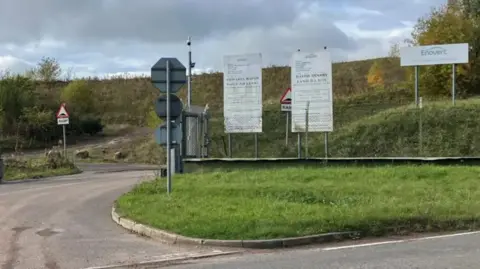'People have suffered enough' over tip smell, councillor says
 BBC
BBCAction needs to be taken to reduce the smell around a landfill site or it should be shut down, Wrexham councillors have said.
Hafod near Johnstown has been under additional monitoring for six months after complaints of a "rotten egg" smell from residents.
A new report has shown while there are fluctuating hydrogen sulphide levels at the site – the gas responsible for the smell – they are not enough to cause significant harm.
But one specialist at Public Health Wales said some levels detected in communities nearby may be enough to cause runny eyes and a sore throat.
Site operators Enovert described the data as a "snapshot" and said odour management was an active process.
During lockdown people living in the area said the "horrendous" smell from the landfill became "unbearable" after a fire at the site in May 2020.
Enovert were issued with a statutory notice by Natural Resources Wales (NRW) in December 2023 for breaching its environmental permit.
While the company said it had taken "all appropriate measures to comply", more than 300 complaints were raised about the landfill site between October 2023 and August 2024.
Sensors have now been placed around the site and in areas where most complaints have been received.
On Tuesday, Wrexham council's homes and environment scrutiny committee members said they remained concerned about a lack of a clear timeline from Enovert to resolve the smell, which has been an issue for 18 years.
"The people have suffered enough," said Ponciau councillor Paul Pemberton.
Pemberton said the situation was improving but he worried the council would be sitting in 10 years "still talking about the same thing".
"Everybody needs to pull their fingers out quicker than they already have to hopefully make the situation better. Either get it right or shut it."

The first of a new monitoring report of the site confirmed about 23% of the time the smell reaches a level where people can detect it.
The highest level of hydrogen sulphide recorded was 17.97 parts per billion (ppb).
The safe exposure limit is between 10,000 and 20,000ppb.
But on 547 occasions the level of gas in the air exceeded 4ppb – the level at which 50% of people notice the smell it creates.
Kristian James from PHW told councillors it may be enough to cause what is classed as nuisance irritation – with some people experiencing runny eyes and a sore throat.
"I'd like to propose that if the data continues to show breaches in the levels of hydrogen sulphide, that we as a council look at taking enforcement action," said Queensway councillor Carrie Harper.
Harper said Wrexham council, NRW and Welsh ministers had the power to act on the issue.
"No-one has been willing to step up and defend these communities. I don't think it's any surprise frustration is building."
Enhanced monitoring will continue across other affected communities in the coming months and an update will be brought back to committee members in six months.
Late last year it was confirmed there had been an increase in waste dumped at the site, in particular from Liverpool, with 37% of all waste at the site being from Merseyside.
Ian Craven, Enovert's regional manager, described the data in the report as a "snapshot" and said it needed to look at a longer period of time to factor in the weather and background sources of hydrogen sulphide.
He said the first full month of enhanced monitoring has shown intermittent spikes in the smell level, adding the company was keen to trap all the gas it could.
"As with all landfill sites of this type, the management of odours is an active process which requires us to respond to developing site and weather conditions," he said.
"The open nature of site operations means there can be occasions where odour is a risk. We have always rapidly responded to any opportunity to make improvements."
